AI for Sales Engineering: Top 9 Tools, Use Cases, and Proven ROI
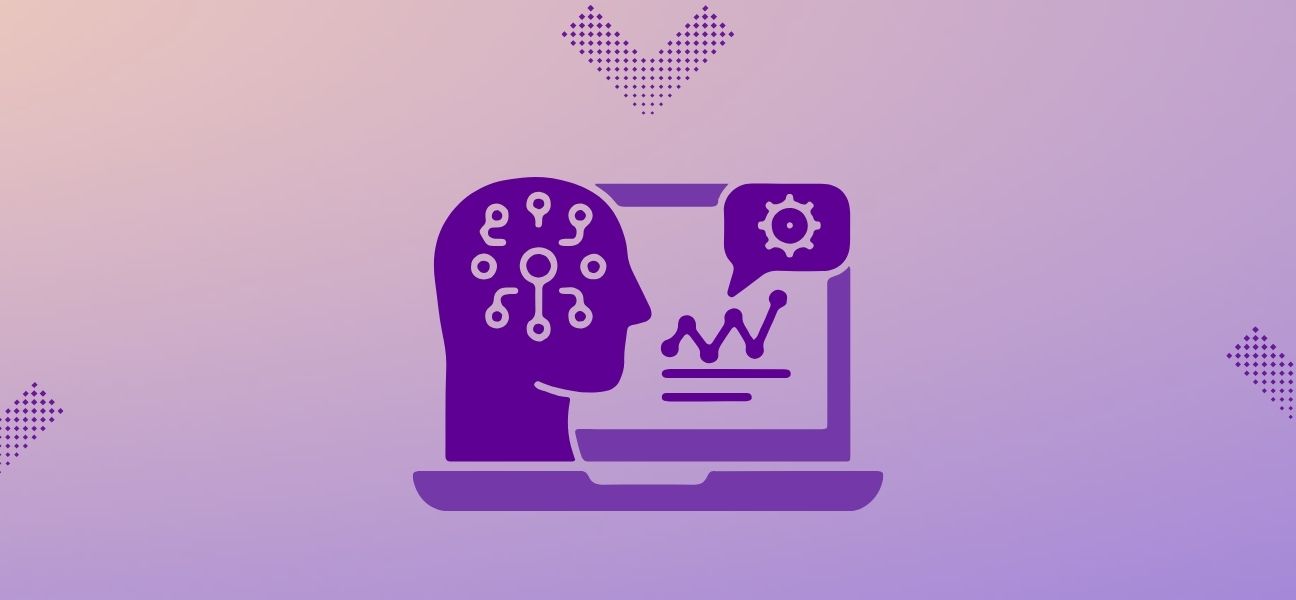
Sales engineering sits at the center of technical validation in B2B deals. From discovery to demos, proof-of-concepts, and RFP responses, sales engineers (SEs) are expected to deliver speed, precision, and credibility under tight deadlines. Yet most teams spend far more time on manual prep than on high-value solutioning.
Salesforce research shows sellers spend less than 30% of their time actually selling; the rest is consumed by updating documents, drafting responses, and searching for information. Bain’s 2025 Technology Report adds that while AI has already transformed productivity in other business functions, sales and presales remain under-automated, despite being among the most time-intensive workflows.
That gap is now closing. Purpose-built AI tools can auto-draft RFP responses with 95% accuracy, flag outdated technical content, and even prepare demo scripts from discovery notes. For sales engineers, this means less time chasing content and more time engaging strategically with buyers.
This blog explores how AI fits into core SE workflows, which outcomes matter most, and how to measure ROI without losing accuracy or governance.
TL;DR - Key Takeaways
- Sales engineering teams lose 60–70 % of active hours to documentation, RFP drafting, and demo prep instead of technical storytelling.
- Grounded AI eliminates repetition by generating compliant drafts, surfacing verified content, and accelerating proof-of-concept creation.
- When deployed with governance, AI improves accuracy to 95 %, shortens proposal cycles by 90 %, and raises evaluator win scores by up to 50 %.
- Platforms such as Inventive AI give presales leaders measurable ROI within one quarter, speed, consistency, and evaluator alignment without sacrificing control.
Mapping the Sales Engineering Workflow
Sales engineering isn’t a single task; it’s a set of parallel workflows that run throughout the sales cycle. Understanding these stages is the first step in identifying where AI can add meaningful leverage.
- Discovery & Qualification
SEs join early calls to assess technical fit, capture buyer requirements, and identify integration needs. They must quickly synthesize context into actionable solution options. - Solution Design & Scoping
Drafting architectures, solution summaries, and technical specs is repetitive and time-consuming. SME bottlenecks often slow down scoping exercises. - Demo & Proof-of-Concept (PoC) Creation
Building demo environments requires configuring data, tailoring flows, and customizing scenarios for each prospect. Delays here can stall the sales cycle. - RFP & Security Questionnaires
SEs frequently draft detailed technical responses. Without centralized knowledge, responses become inconsistent, error-prone, and time-intensive. - Handoff to Delivery Teams
Transitioning from presales to delivery requires precise documentation of assumptions, architectures, and constraints. Gaps or inconsistencies here create downstream risk.
These workflows highlight the two consistent pain points across SE teams: (1) too much manual, repetitive work, and (2) accuracy and consistency challenges when information lives in silos. AI directly addresses both, but only when grounded in verified knowledge sources and applied with strong governance.
Read more: How to Write an Effective RFI Response That Wins Deals
Where AI Fits in Sales Engineering Workflows
AI delivers the most impact when mapped directly to sales engineering stages. Instead of treating it as a generic assistant, the key is aligning AI with the specific friction points SEs face every day.
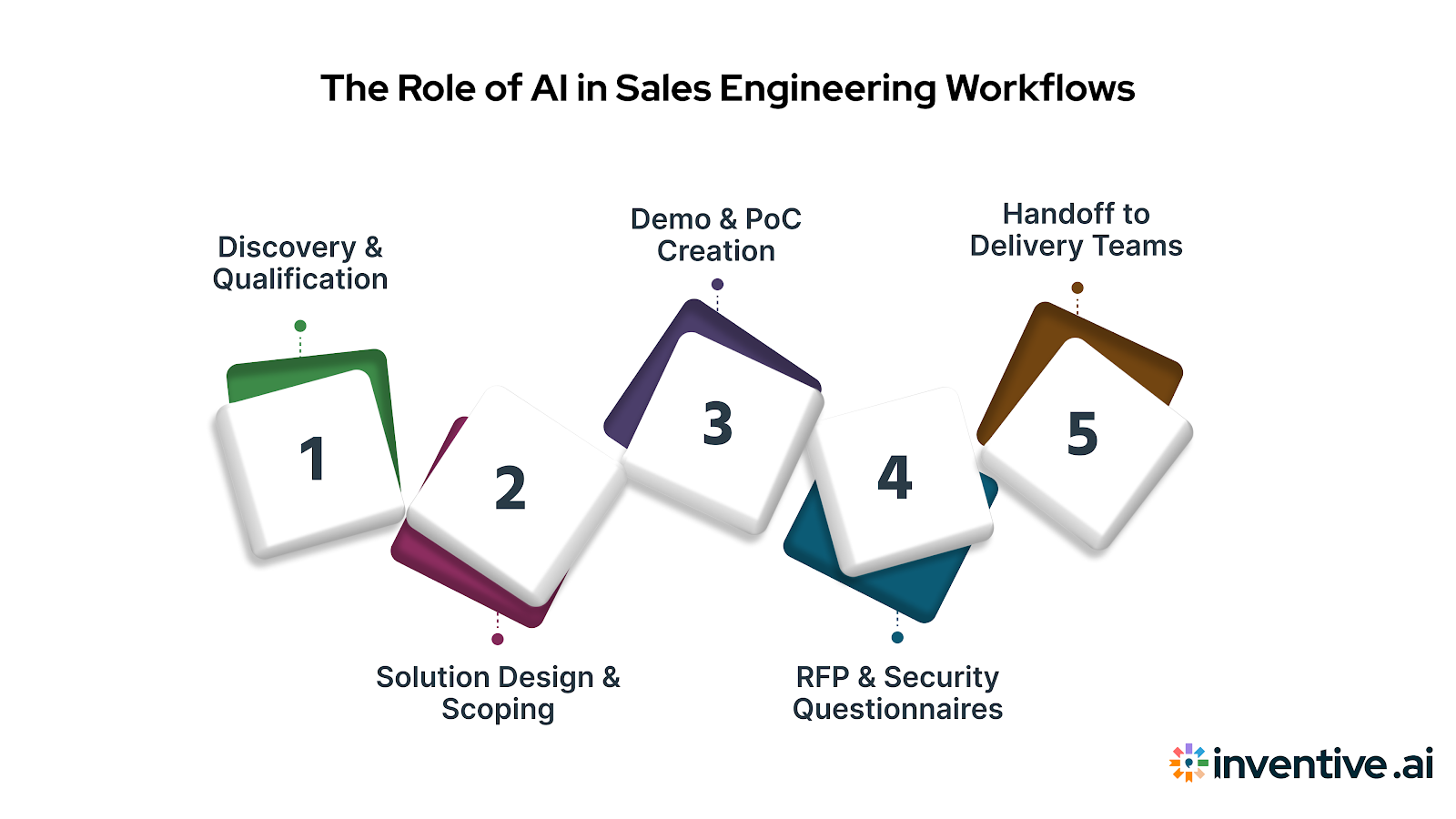
Discovery & Qualification
- AI-generated call summaries capture technical requirements from discovery sessions, pulling out risks, integrations, and key buyer priorities.
- Context extraction highlights recurring pain points across opportunities, giving SEs insight into what matters most before design begins.
- Signal analysis (from tools like Gong or Clari) helps presales anticipate objections or technical blockers earlier in the cycle.
Solution Design & Scoping
- Content reuse: AI retrieves relevant snippets from verified content libraries, so engineers don’t start diagrams and solution descriptions from scratch.
- Gap analysis prompts: AI flags missing details (e.g., integration steps, compliance references) and routes them to SMEs for completion.
- Architecture drafting: Some platforms assist by creating baseline diagrams or summaries that SEs can refine for specific deals.
Demo & Proof-of-Concept (PoC) Creation
- Script generation: AI copilots suggest demo scripts or talking points tailored to industry and buyer profile.
- Scenario recommendations: Based on past wins or discovery context, AI highlights features most likely to resonate with evaluators.
- Reusable demo environments: Platforms like Demostack automate setup and data overlays, reducing manual demo prep cycles.
RFP & Security Questionnaires
- Grounded drafting: AI can auto-draft up to 100% of responses from verified internal sources. With Inventive AI, drafts are generated 10× faster, with 95% accuracy and zero hallucination.
- Conflict detection: Automation flags contradictory or outdated technical details across responses.
- Ownership workflows: Tasks are assigned to SMEs with deadlines, ensuring accountability while reducing version chaos.
Handoff to Delivery Teams
- Auto-generated documentation: Assumptions, solution notes, and technical caveats captured during presales can be structured into deliverable docs.
- Traceability: AI maintains links between proposal language and verified sources, reducing misalignment in post-sale implementation.
By embedding AI across each workflow stage, SEs shift from firefighting and formatting to high-value solution storytelling. The result is not just faster output but also more accurate, evaluator-aligned responses that build buyer confidence.
Read more: How AI Enhances Deal Velocity: Key Strategies and Insights
Measurable Outcomes & KPIs for AI in Sales Engineering Workflows
Executives and presales leaders rarely buy into “time savings” alone. They need proof that AI adoption in sales engineering workflows translates into business outcomes. The following KPIs demonstrate where AI delivers measurable ROI:
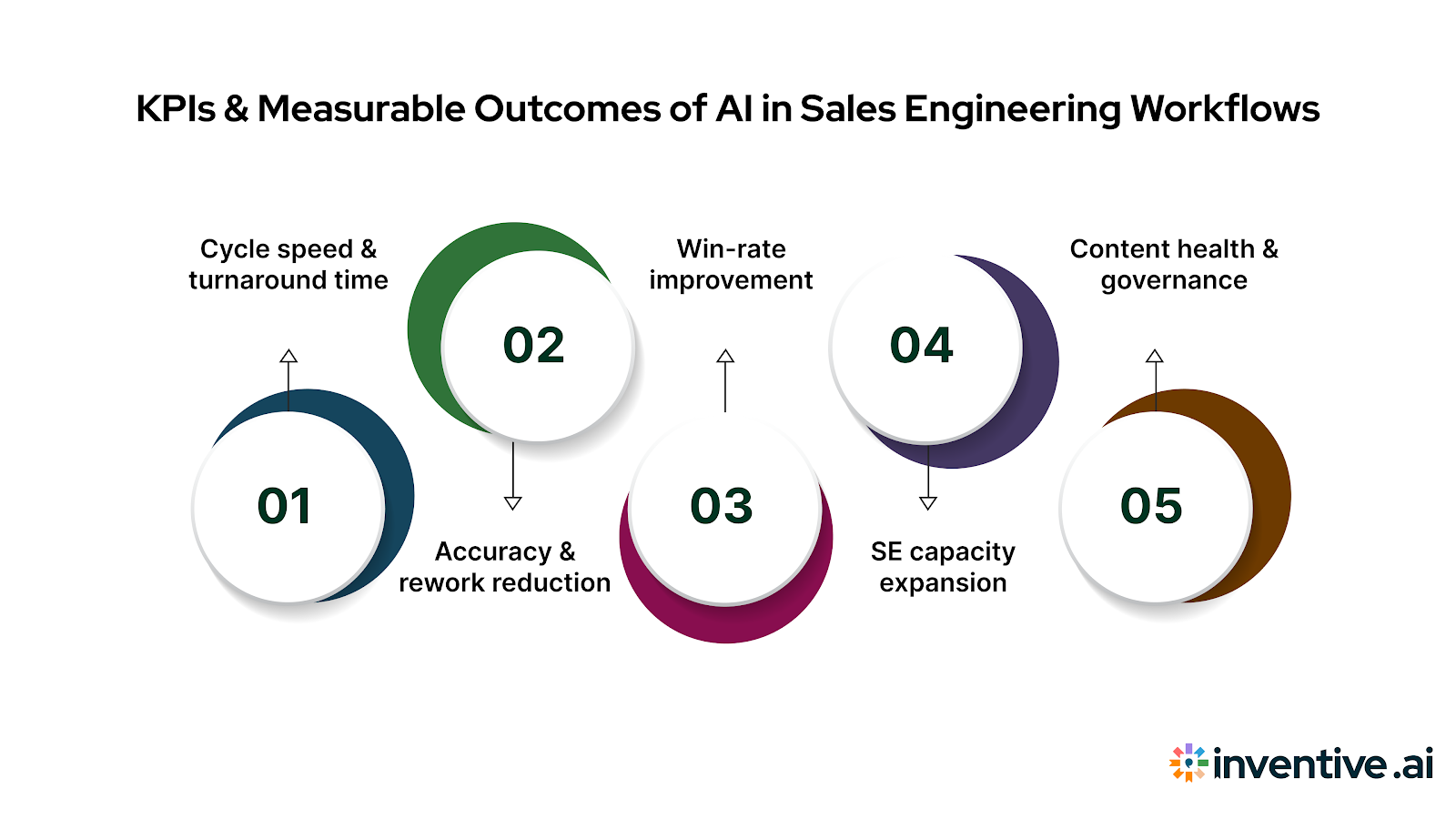
1. Cycle speed and turnaround time
- Metric: Average draft time for RFPs, proposals, or demos.
- Impact: AI reduces drafting cycles by up to 90%, giving SEs days back per opportunity. Faster responses mean more opportunities supported in the same quarter.
2. Accuracy and rework reduction
- Metric: % of responses sourced from verified internal libraries; number of reviewer corrections.
- Impact: With grounded systems, AI maintains 95% accuracy and 0% hallucination, cutting down rework and reducing the risk of errors that could hurt credibility.
3. Win-rate improvement
- Metric: Closed-won deals influenced by evaluator-aligned proposals.
- Impact: When AI aligns proposals with buyer scoring criteria through Win Themes, SEs see up to a 50% lift in win rates, especially in complex, evaluator-driven deals.
4. SE capacity expansion
- Metric: RFPs, demos, or PoCs completed per quarter without additional headcount.
- Impact: AI enables presales teams to scale support, handling more deals simultaneously while reducing burnout.
5. Content health and governance
- Metric: % of proposal content flagged as outdated or conflicting; time spent resolving conflicts.
- Impact: AI content managers proactively surface stale or conflicting content, ensuring every deliverable remains audit-ready and compliant with the latest standards.
These KPIs give leaders tangible proof that AI is more than a productivity booster; it’s a lever for scaling SE impact, improving evaluator alignment, and accelerating revenue outcomes.
AI Tools for Sales Engineering Workflows (2026)
Sales engineering teams now rely on a diverse range of AI solutions, from demo creation to proposal governance, each designed to address specific workflow bottlenecks.
The tools below represent the most relevant options for presales organizations in 2026.
1. Inventive AI - Proposal & RFP Automation for Sales Engineering Teams
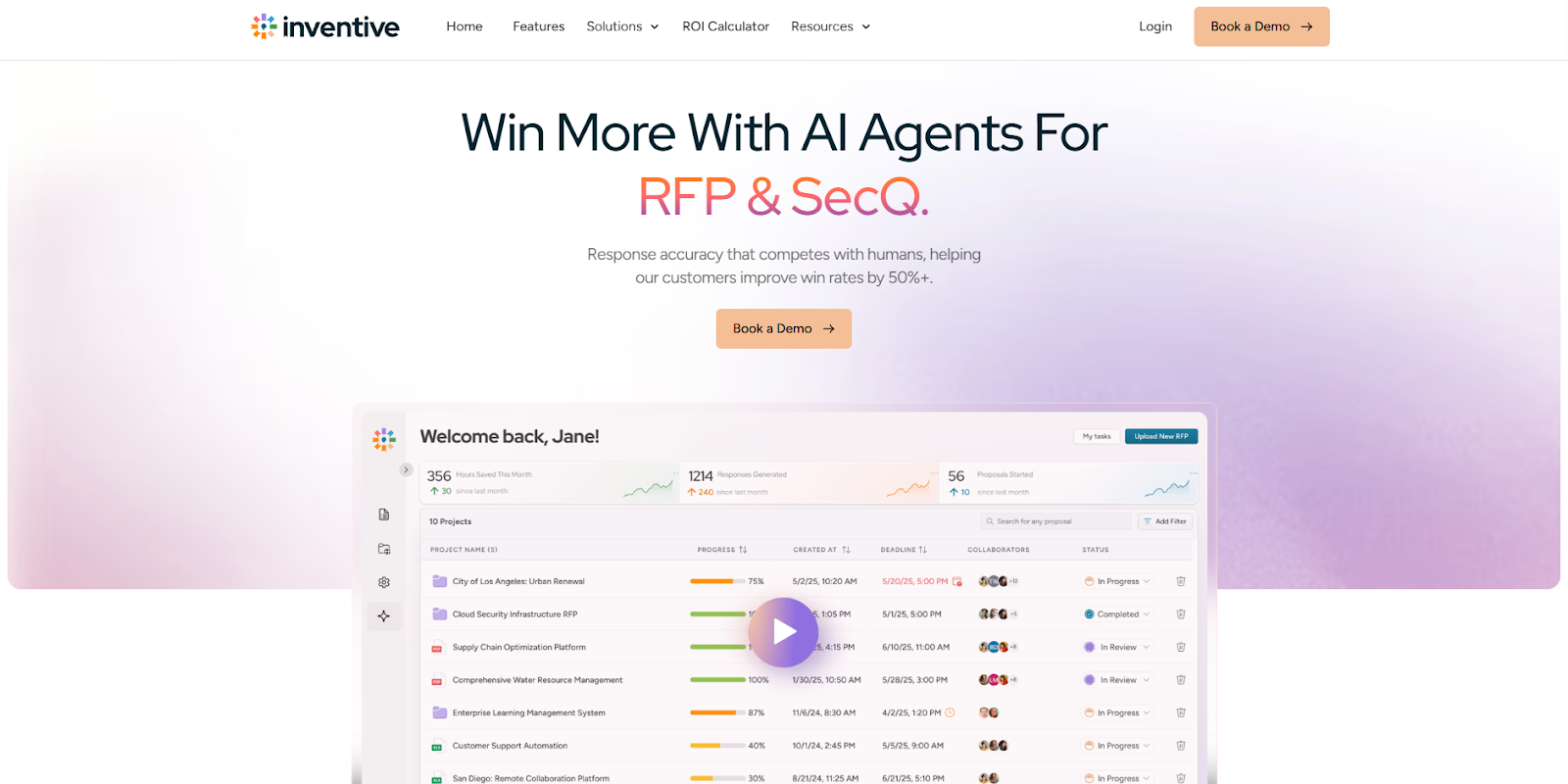
Gartner Rating: 5/5
Key features:
- Evaluator-aligned proposal automation: Automatically drafts RFP and proposal responses 10× faster while aligning every answer to buyer scoring rubrics through its proprietary Win Themes engine.
- Citation-backed accuracy: Each response is grounded in verified internal libraries, ensuring 95 % accuracy and 0 % hallucination.
- Governed collaboration: Includes version control, SME review workflows, and audit trails for full transparency across presales, compliance, and delivery teams.
- End-to-end integrations: Connects with Salesforce, HubSpot, SharePoint, Google Drive, Slack, Notion, and Confluence to pull verified content where sales engineers already work.
- Content health monitoring: Continuously flags outdated or conflicting technical information, maintaining data integrity across global teams.
Pros:
- Replaces manual RFP drafting and validation with grounded, auditable automation.
- Enhances collaboration between AEs, SEs, and compliance reviewers through shared governance.
- Scales presales capacity without increasing headcount.
Cons:
- Limited analytics available for enterprise-level reporting.
Pricing: Flexible usage-based pricing aligned with your organization’s RFP submission volume.
Best for: Sales-engineering organizations that manage frequent RFPs, security questionnaires, and technically complex proposals requiring factual precision and evaluator alignment.
2. Demostack - Demo & Proof-of-Concept Automation Platform
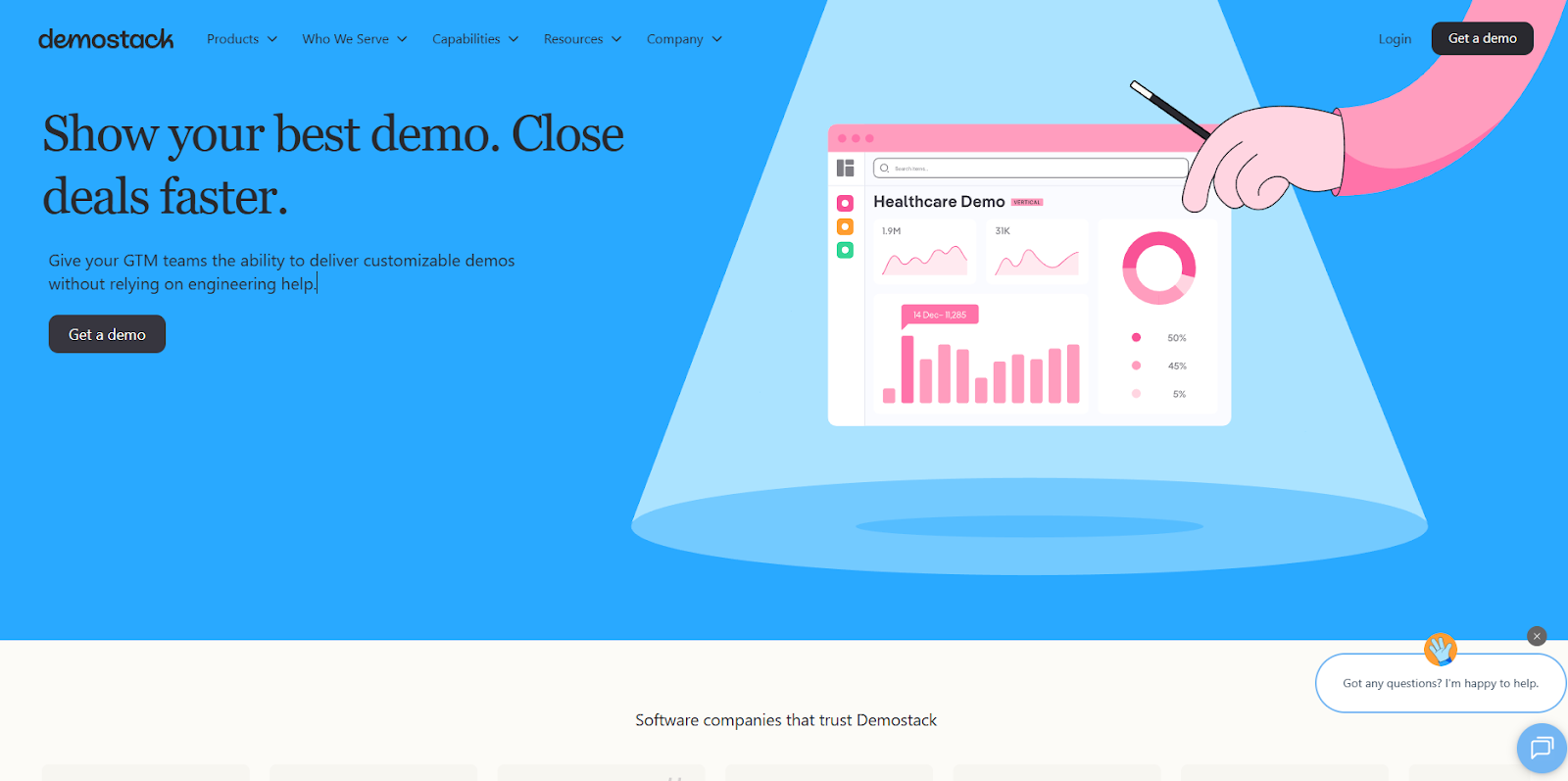
Gartner Rating: 4.6/5
Key features:
- Provides a no-code environment for cloning product instances to create demo or PoC versions.
- Includes a library and version control system for maintaining standardized demo assets.
- Offers integrations with common CRM and collaboration platforms.
Pros:
- Reduces repetitive setup work when preparing product demonstrations.
- Centralizes demo assets for internal coordination.
Cons:
- Designed primarily for demo creation, it lacks functions for proposal or RFP content management.
- Cost structure may limit adoption for smaller presales teams.
Pricing: Custom quoting; publicly referenced ranges begin near US$50,000/year.
Best for: Organizations requiring consistent, reproducible product demos across multiple sales cycles.
3. Otter.ai - Meeting Transcription & Notes Platform
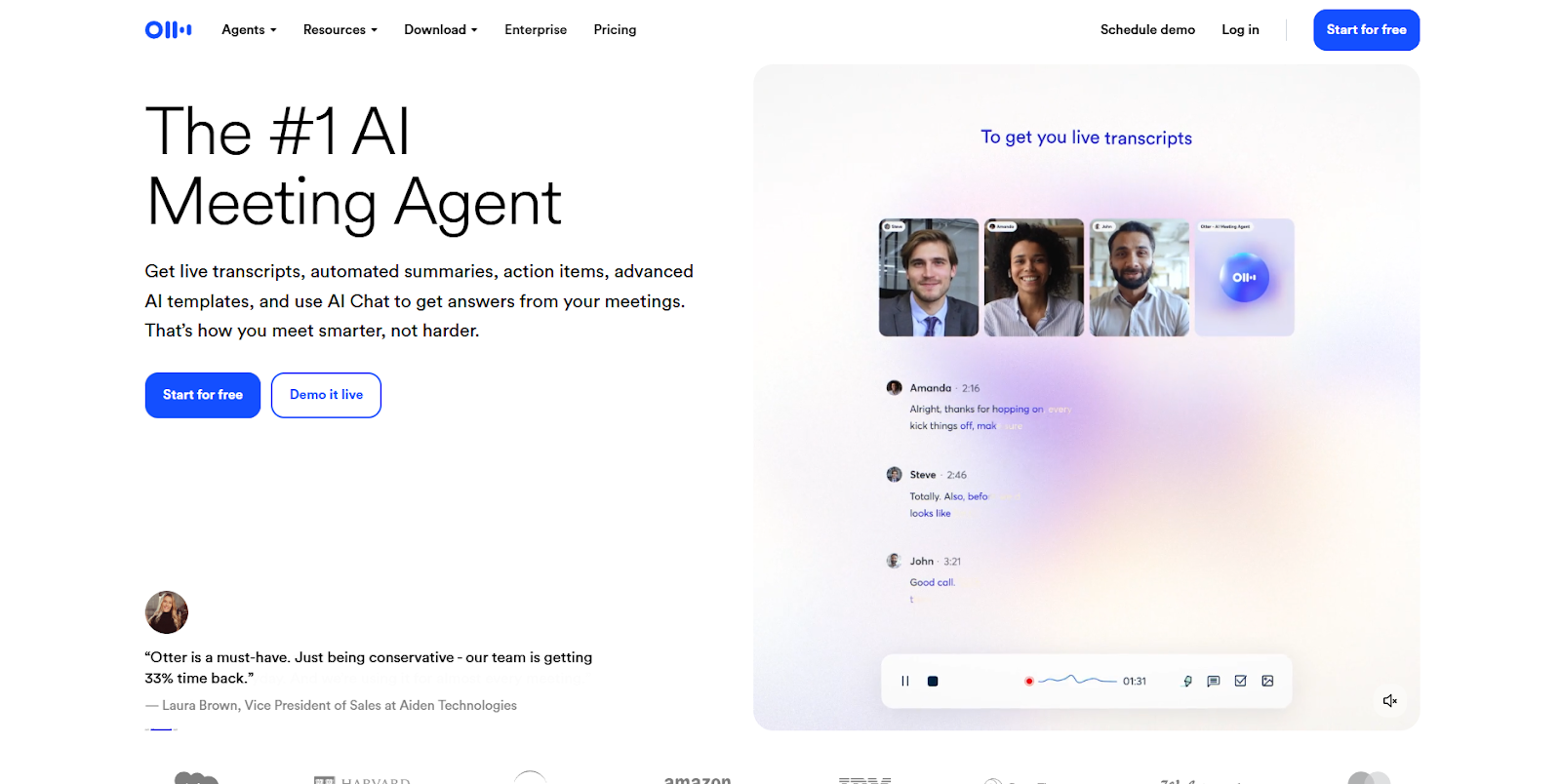
Gartner Rating: 4.2/5
Key features:
- Records and transcribes meetings from platforms such as Zoom and Google Meet.
- Generates automated summaries, highlights, and searchable transcripts.
- Allows export or CRM synchronization of meeting notes.
Pros:
- Captures technical discussions and follow-up actions without manual note-taking.
- Simplifies review of customer or internal meetings.
Cons:
- Limited to transcription and summary; does not extend into workflow or content automation.
- Output quality can depend on call audio and domain complexity.
Pricing: Free tier available; paid plans start around $10 per user/month.
Best for: Sales-engineering and solution teams handling frequent technical calls that require accurate documentation.
4. Calendly - Scheduling & Availability Automation Platform
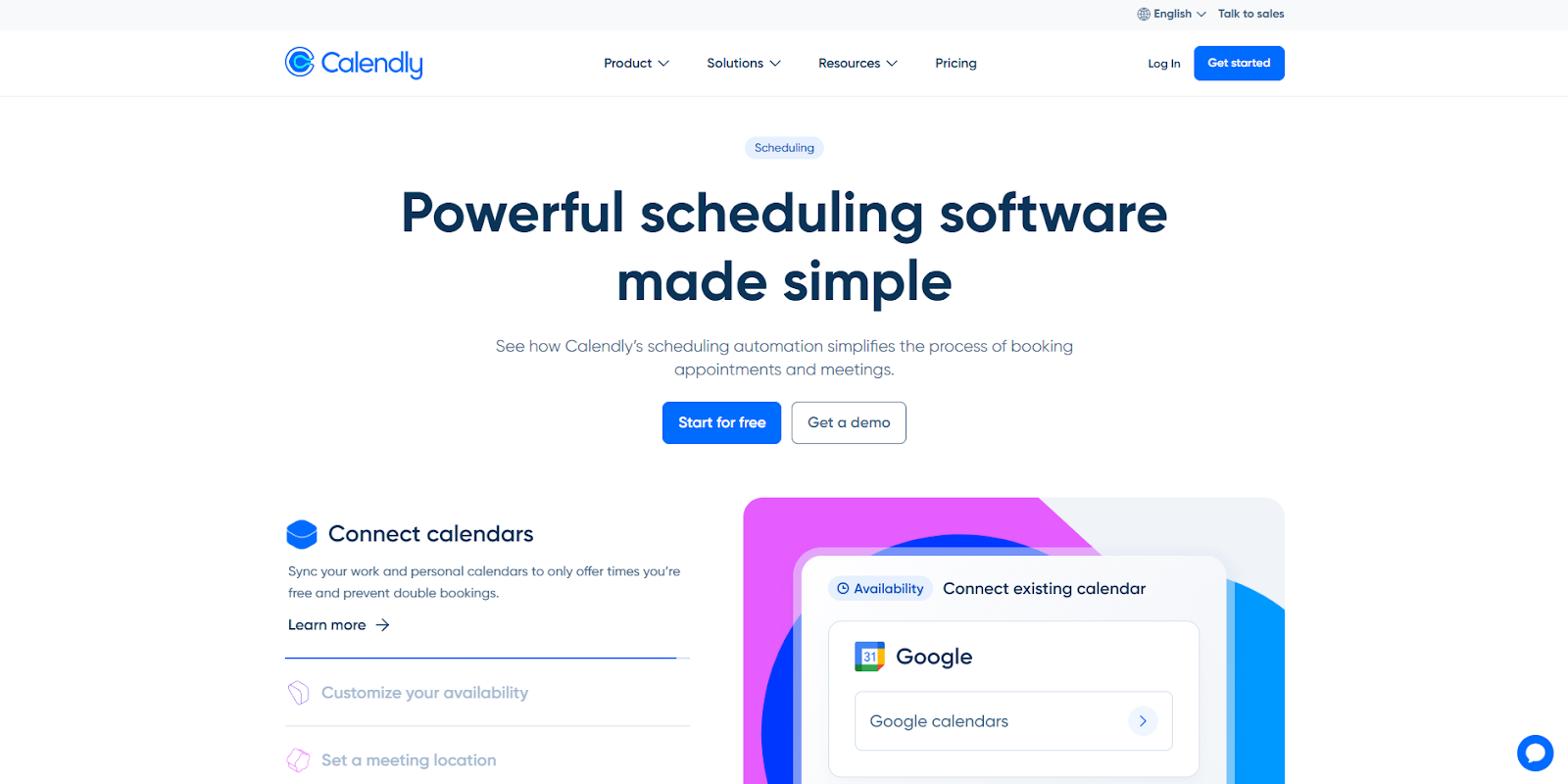
Gartner Rating: 4.6/5
Key features:
- Allows prospects or team members to book meetings within predefined time slots.
- Includes options for routing, such as Round Robin or pooled availability for internal scheduling.
- Integrates with common calendar and conferencing tools, including Outlook, Google Calendar, Zoom, and Microsoft Teams.
- Can record meeting data in CRM systems like Salesforce or HubSpot through native connectors.
Pros:
- Reduces manual coordination for scheduling technical discussions or demos.
- Maintains consistent visibility of meeting commitments across presales calendars.
Cons:
- Focused exclusively on scheduling; provides no content or workflow automation.
- Enterprise deployment may require data-sharing and privacy configuration review.
Pricing: Free tier; paid plans start at around $12 per user/month.
Best for: Teams that require structured booking processes for discovery or demo calls.
5. Vivun - Presales Execution & Demo Automation Platform
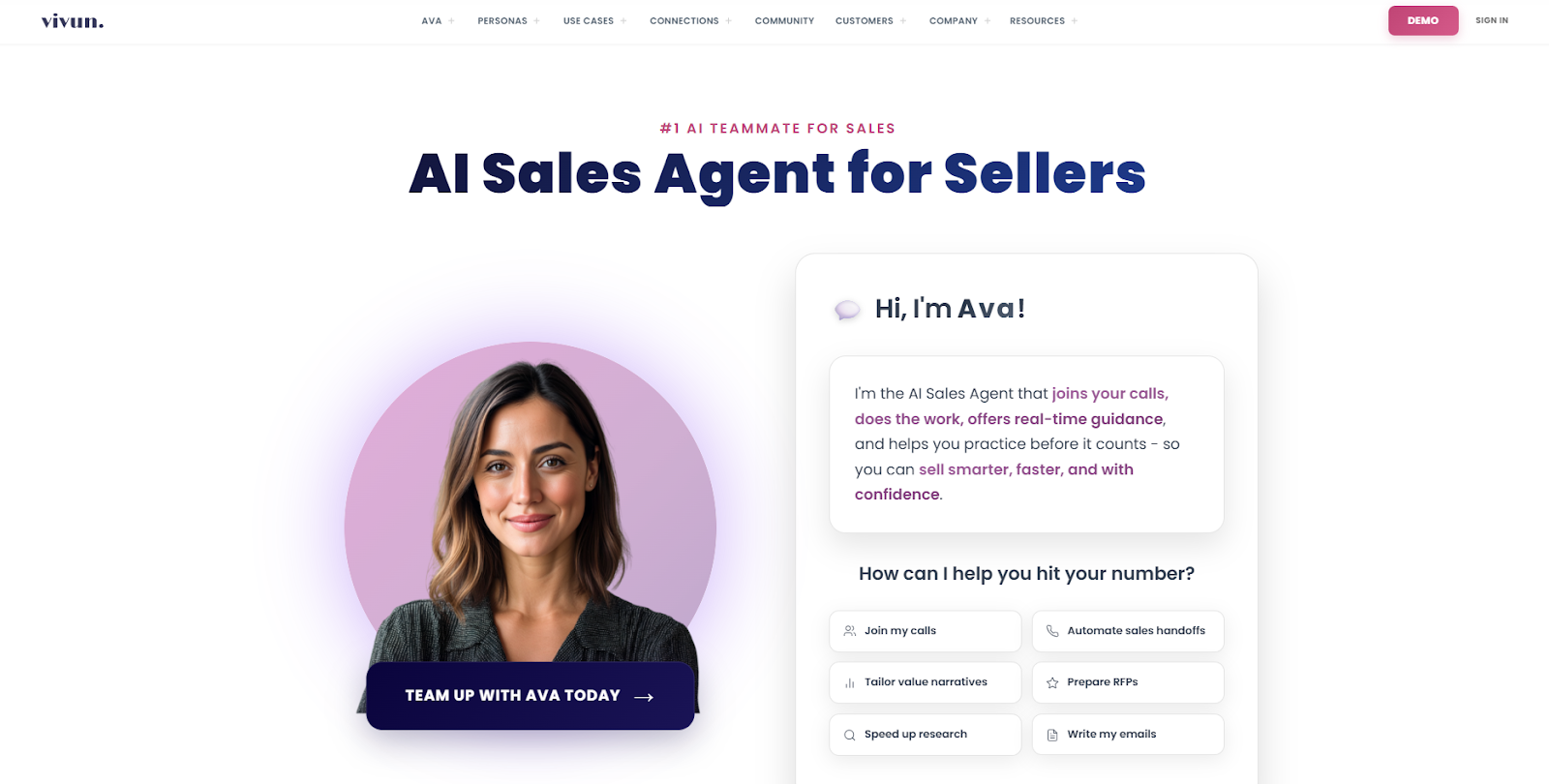
Gartner Rating: 4.0/5
Key features:
- Consolidates presales activity data, demo operations, and deal qualification in one interface.
- Applies AI-based matching between opportunity records and technical solution components.
- Integrates with CRM systems such as Salesforce to map presales influence on revenue.
Pros:
- Provides structured visibility into presales workload and opportunity coverage.
- Useful for maintaining consistency in demo operations and technical validation records.
Cons:
- Limited independent benchmarking data beyond vendor claims.
- May require process standardization before measurable impact is achieved.
Pricing: Custom enterprise pricing.
Best for: Presales and technical-sales teams seeking operational visibility across demos and solution design tasks.
6. Zapier - Workflow & Integration Automation Platform
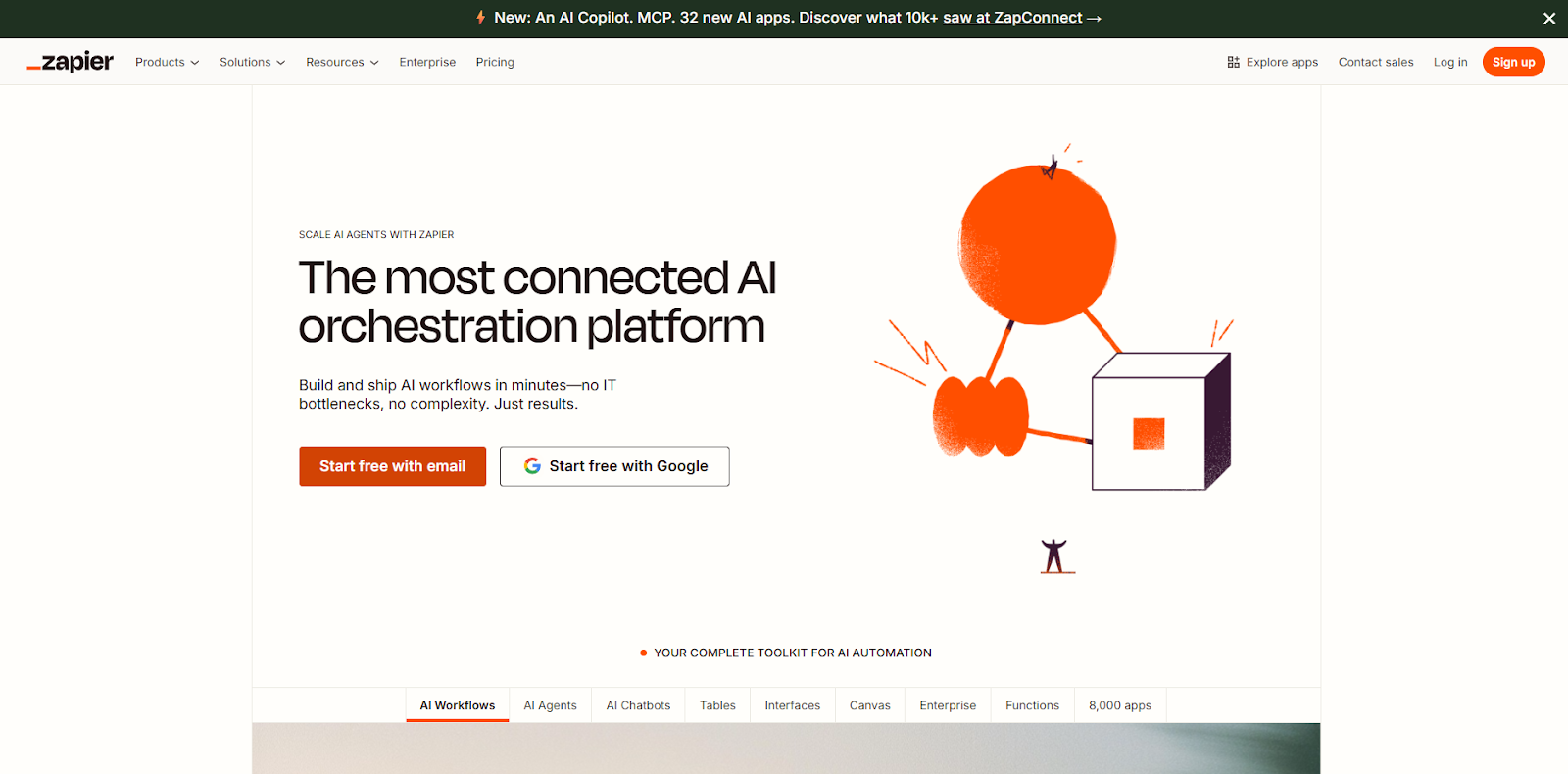
Gartner Rating: 4.6/5
Key features:
- Connects cloud applications and triggers automated actions across systems such as CRM, Slack, and email.
- Supports creation of lightweight integrations for notifications, data sync, or prototype PoC workflows without code.
- Offers an extensive app library exceeding 6,000 connectors.
Pros:
- Enables presales staff to automate low-complexity manual tasks without developer resources.
- Useful for creating quick proof-of-concept integrations during evaluation phases.
Cons:
- Generic automation tool; not designed specifically for sales-engineering workflows.
- Lacks governance, documentation control, or compliance features required for enterprise proposals.
Pricing: Free tier; paid plans start from $19.99 per user per month.
Best for: Users who need basic process automation between existing presales tools.
7. 1up - Knowledge & Questionnaire Automation Platform
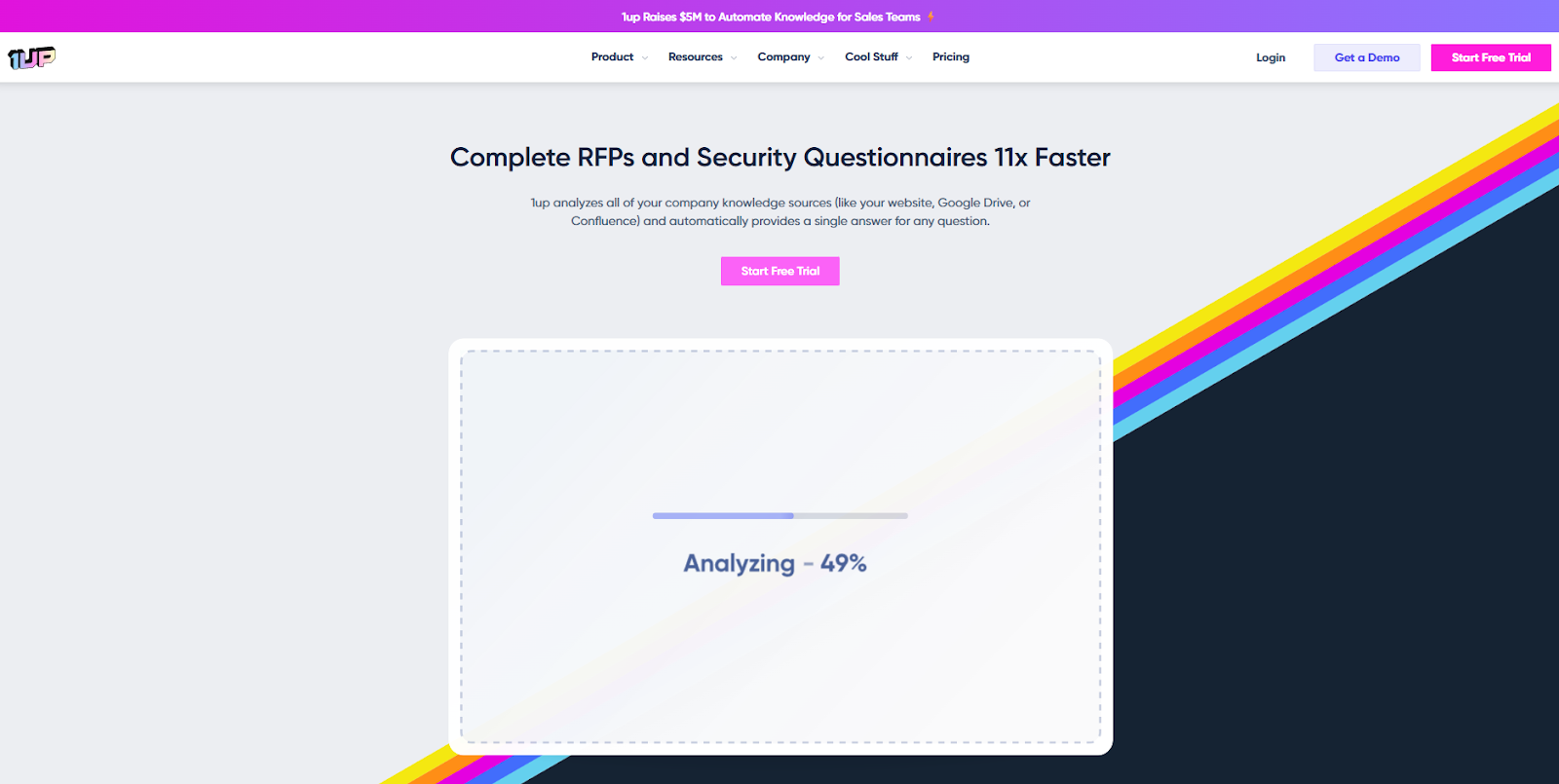
Gartner Rating: 4.9/5 (based on 8 reviews)
Key features:
- Centralizes verified content from multiple repositories into a unified knowledge base.
- Uses retrieval-based AI to populate responses for RFPs, DDQs, and security questionnaires.
- Integrates with content platforms such as Google Drive, Slack, and Confluence.
- Provides optional SME review and approval workflows.
Pros:
- Reduces repetitive lookup work during questionnaire completion.
- Maintains an internal record of approved technical content.
Cons:
- Does not include evaluator-alignment scoring or proposal-governance functions.
- Limited insight into overall proposal performance metrics.
Pricing: Custom enterprise pricing.
Best for: Presales or compliance teams responsible for large volumes of standardized questionnaire responses.
8. Gamma - AI Presentation & Deck Creation Platform

Gartner Rating: N/A
Key features:
- Generates presentations and web-based slides using text inputs or uploaded materials.
- Converts technical notes or outlines into structured decks or briefing pages.
- Includes engagement tracking to show slide-view activity and viewer duration.
- Offers export or share options for review and collaboration.
Pros:
- Streamlines preparation of presentation materials for demos or internal sessions.
- Produces standardized, visually consistent decks without extensive design effort.
Cons:
- Not purpose-built for presales or technical documentation governance.
- Limited customization for enterprise branding and compliance requirements.
Pricing: Free basic plan; paid plans start at $8 per user/month.
Best for: Teams that require rapid creation of slide decks or presentation content for customer or internal meetings.
9. Gong - Conversation Intelligence & Deal Analytics Platform
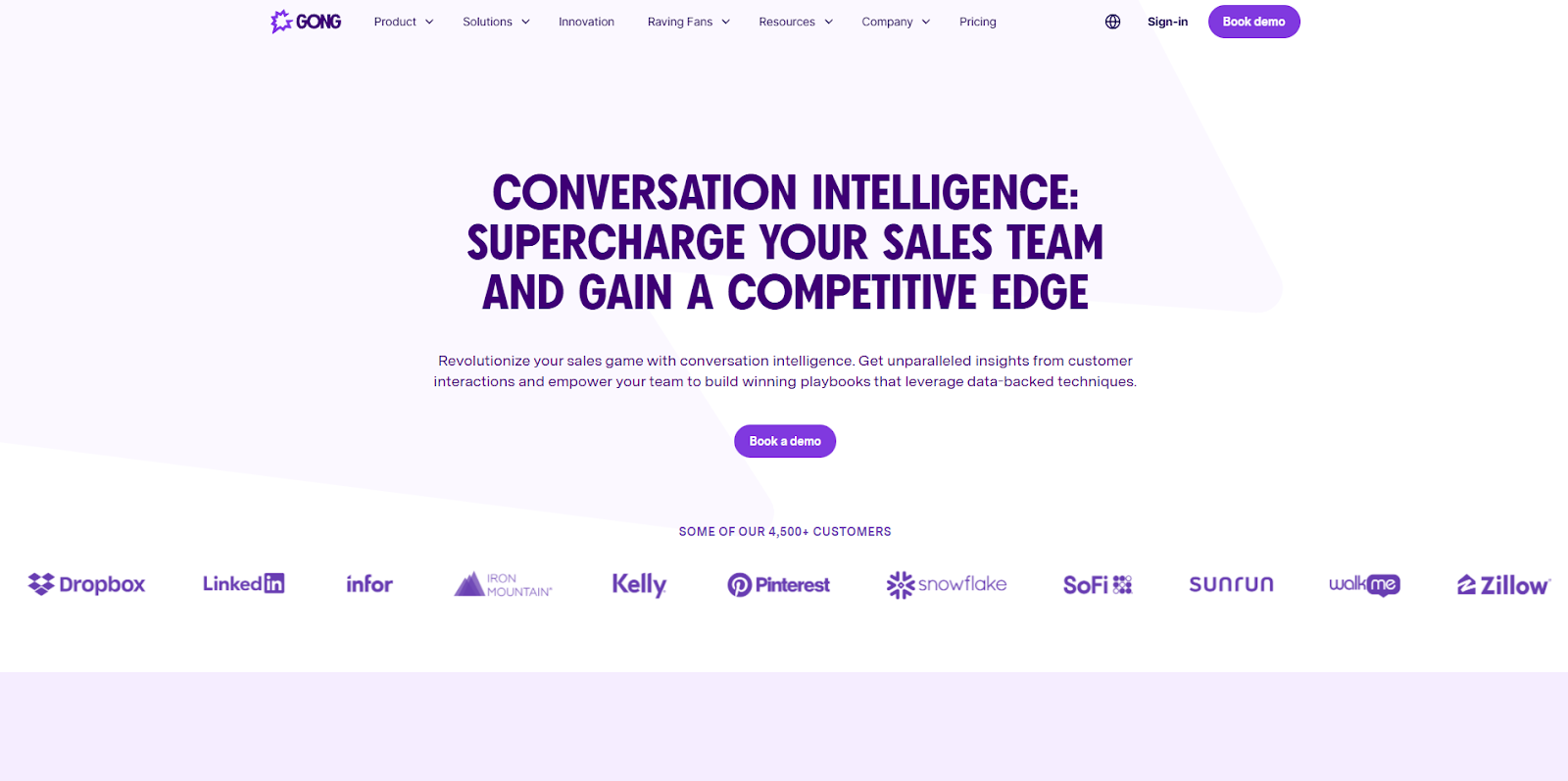
Gartner Rating: 4.7/5
Key features:
- Records and transcribes sales or technical calls for later analysis.
- Uses natural-language processing to detect keywords, objections, or sentiment trends.
- Provides dashboards that summarize talk ratios, activity patterns, and engagement levels.
- Integrates with major CRM systems for call-to-deal correlation.
Pros:
- Creates an accessible record of prospect interactions and technical discussions.
- Offers data points useful for coaching or identifying areas of buyer hesitation.
Cons:
- Focuses primarily on call and conversation analytics; not a presales workflow system.
- Requires policy configuration to ensure compliance with recording and data privacy standards.
Pricing: Custom enterprise pricing.
Best for: Organizations analyzing meeting data to improve sales and presales-team communication practices.
Summary Table
AI solutions supporting sales-engineering teams fall into distinct categories, from demo automation to meeting documentation. Each tool addresses a specific stage in the technical presales workflow.
Each platform in this category addresses a narrow slice of the sales-engineering workflow - demos, scheduling, transcription, or content retrieval.
However, few connect these functions with the accuracy, auditability, and evaluator alignment that presales teams require when handling RFPs or technical submissions.
That’s where Inventive AI differentiates itself. Instead of automating surface-level tasks, it embeds directly into the proposal layer - where sales engineers, solution consultants, and compliance teams converge.
By grounding every response in verified company data and mapping it to buyer-scoring logic, proposal automation becomes a measurable, repeatable advantage across the presales organization.
Implementation Playbook for Sales Engineering Teams
Adopting AI in sales engineering is less about adding another tool and more about creating a repeatable workflow that balances speed, accuracy, and governance. Teams that succeed typically follow a phased playbook:
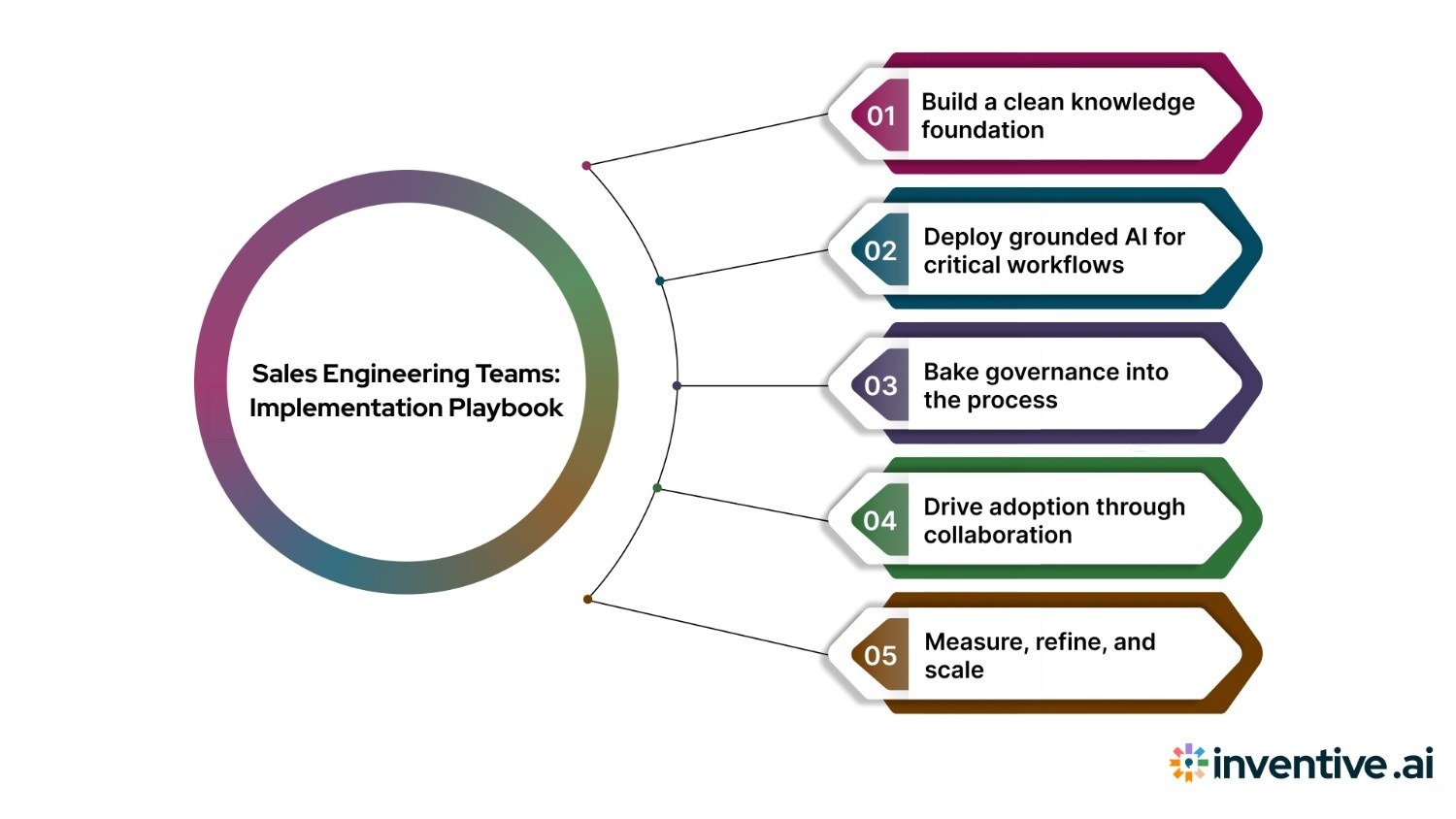
1. Build a clean knowledge foundation
- Consolidate prior RFPs, solution briefs, compliance docs, and demo scripts into a central library.
- Tag content by category (security, pricing, integrations) to make it searchable and reusable.
- Establish ownership, e.g., IT for security sections, finance for pricing, so content stays fresh.
2. Deploy grounded AI for critical workflows
- Start with high-friction, high-volume tasks: RFP drafting, demo prep, PoC documentation.
- Use AI that grounds outputs in your verified content (not generic web data) to ensure 95% accuracy and compliance.
- Run side-by-side pilots to compare AI-generated drafts against human-only baselines to prove measurable efficiency gains.
3. Bake governance into the process
- Activate conflict detection to prevent inconsistent claims (e.g., “99.9% uptime” vs. “99.5% uptime”).
- Set role-based permissions: sales engineers draft, SMEs validate, proposal managers approve.
- Track every edit and approval with audit trails to maintain compliance standards.
4. Drive adoption through collaboration
- Integrate AI into daily tools like Slack, Teams, and CRM so sales engineers don’t need to context-switch.
- Create feedback loops: presales engineers flag where AI drafts need improvement, so the system learns over time.
- Share quick wins, e.g., “This RFP first draft was done 10× faster” to build trust and buy-in.
5. Measure, refine, and scale
- Define clear KPIs (cycle time, accuracy, win rate, SE capacity).
- After proving ROI in one workflow (like RFP automation), expand into demos, PoCs, and training content.
- Scale adoption across regions, business units, and product lines, keeping governance at the center.
By treating AI as an integrated layer in presales workflows, not a bolt-on, organizations create long-term leverage. Sales engineers spend less time formatting and chasing content and more time influencing deals.
Read more: Top 10 Proposal Automation Tools for Sales Enablement
Conclusion
Sales engineering sits at the center of modern B2B deals, balancing technical accuracy with the need for speed. Yet too often, these teams lose hours to repetitive drafting, scattered content, and manual approvals. AI has shifted that equation.
When applied with governance and context, AI doesn’t just make sales engineers faster; it makes them more strategic. Workflows that once drained time RFP responses, demo prep, and PoC documentation now run up to 90% faster with 95% accuracy. More importantly, evaluator alignment through tools like Win Themes directly improves win rates by up to 50%, giving revenue teams a measurable competitive advantage.
But not all AI platforms are built for sales engineering. Generic copilots may draft words, but they can’t guarantee compliance or map answers to buyer scoring rubrics. That’s where Inventive AI stands apart, grounding every draft in your verified content, eliminating hallucination, and weaving accuracy, collaboration, and analytics into one platform.
Sales engineering leaders now face a choice: continue stretching teams thin with manual workflows, or embed AI into their core processes and turn proposal accuracy and timeliness into a repeatable growth engine.
Ready to see how AI can transform your sales engineering workflows?
Book a demo with Inventive AI and learn how top SaaS revenue teams achieve faster responses, higher win rates, and scalable presales performance.
“Inventive AI produced the best-quality answers of every tool we tested — accurate, sales-ready, and fast.”
— Jason Campbell, Senior Sales Engineer, RAD AI

90% Faster RFPs. 50% More Wins. Watch a 2-Minute Demo.
Tired of watching deal cycles stall due to manual questionnaire back-and-forth, Dhiren co-founded Inventive AI to turn the RFP process from a bottleneck into a revenue accelerator. With a track record of scaling enterprise startups to successful acquisition, he combines strategic sales experience with AI innovation to help revenue teams close deals 10x faster.
Understanding that sales leaders struggle to cut through the hype of generic AI, Mukund focuses on connecting enterprises with the specialized RFP automation they actually need at Inventive AI. An IIT Jodhpur graduate with 3+ years in growth marketing, he uses data-driven strategies to help teams discover the solution to their proposal headaches and scale their revenue operations.


.jpeg)